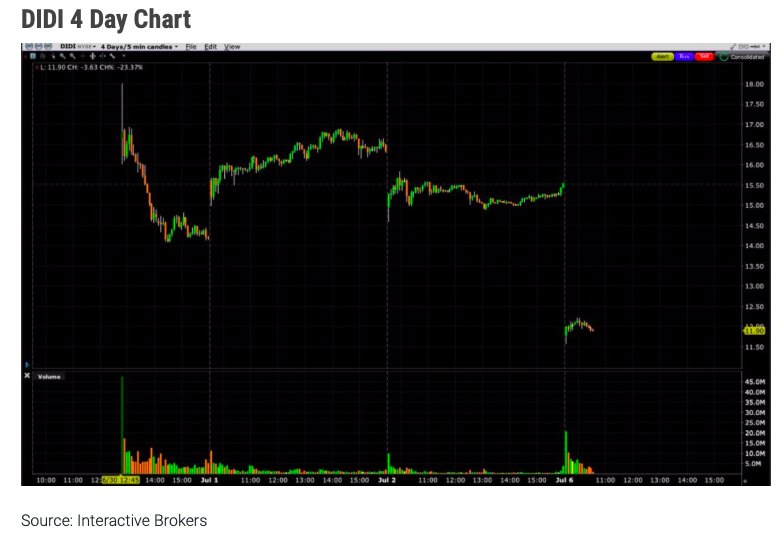By Steve Sosnick, Chief Strategist at Interactive Brokers
US investors sometimes forget that July 4th is just another day in the rest of the world. While we took a day off for the Independence Day holiday, other countries were hard at work. Over our long holiday weekend, the Chinese government was making a move that shocked many US investors when it ordered Didi Chuxing’s (DIDI) app to be removed from app stores.
Last week, one of the more notable IPO stories was the listing of DIDI Global ADRs on the NYSE. The company raised over $4 billion by selling shares at $14/share. The listing did not exactly light the market on fire. The stock touched $18.01 briefly after opening, but then closed at $14.14, just above its offering price. The stock fared better over the next two sessions, but hardly showed true enthusiasm, as we can see below:

China Shock
The ADR never really got going as a “hot issue” before the weekend’s news. As of July 6, the news had pushed the stock down by more than 20% since Friday, and about 15% from the IPO. Investors in the IPO must be feeling burnt. Even though there was some reporting that Chinese regulators suggested that DIDI delay its IPO, that would be cold comfort to investors who are facing losses today.
Regardless of with whom the fault lies – either Chinese regulators or DIDI management — it is clear that someone did not have US investors’ interests at heart. Some investors are asserting that the Chinese government wanted to punish US investors, others are asserting that the investors became collateral damage when the Chinese government decided to crack down further on a high-flying company, and others are angry that the company went ahead and raised money while under a regulatory cloud. I will refrain from a decision as to who is correct here. I have no clarity into the decision process of China’s regulators.
Regulatory Risk
Therein lies the problem for US investors in Chinese shares. There are risks that are unique to those investments, and the companies are subject to control by a government whose objectives may be at odds with those of foreign shareholders.
We already saw China’s moves against Alibaba (BABA) and Ant Financial ahead of the latter company’s anticipated listing. It appears that the government considers it far more important to maintain control over data and intellectual property than profits accruing to shareholders. This morning’s news also reported that Weibo’s (WB) chairman and a state-owned firm are planning to take that company private.
That took the stock over 10% higher before it was denied. The ADRs are still up about 5% because the story makes sense. WB is the dominant social media platform in China, and thus an enormous source of data. Why wouldn’t the Chinese government want to make sure that it has a stake in a company of that sort? And is the market correct in assuming that a takeover of WB would be on market-friendly terms?
Takeaway
The full ramifications for investors of China’s recent moves have yet to be digested. Until that is possible, it argues for investors to be far more risk averse regarding Chinese shares.
If one invests in a Chinese company, one is exposing himself to an extra layer of uncertainty from a government that has just shown that it may not have investors’ interests in mind when making its decisions.
The Chinese growth story is compelling, as are many of China’s companies, but the investment climate in that country and its companies became much more uncertain today.
This post first appeared on July 6 on the Traders’ Insight blog.
Photo Credit: gags9999 via Flickr Creative Commons
DISCLOSURE: INTERACTIVE BROKERS
The analysis in this material is provided for information only and is not and should not be construed as an offer to sell or the solicitation of an offer to buy any security. To the extent that this material discusses general market activity, industry or sector trends or other broad-based economic or political conditions, it should not be construed as research or investment advice. To the extent that it includes references to specific securities, commodities, currencies, or other instruments, those references do not constitute a recommendation by IBKR to buy, sell or hold such investments. This material does not and is not intended to take into account the particular financial conditions, investment objectives or requirements of individual customers. Before acting on this material, you should consider whether it is suitable for your particular circumstances and, as necessary, seek professional advice.
DISCLOSURE: FOREX
There is a substantial risk of loss in foreign exchange trading. The settlement date of foreign exchange trades can vary due to time zone differences and bank holidays. When trading across foreign exchange markets, this may necessitate borrowing funds to settle foreign exchange trades. The interest rate on borrowed funds must be considered when computing the cost of trades across multiple markets.


